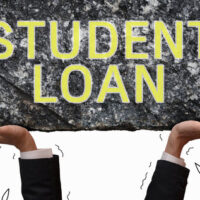Student Loans and Declaring Bankruptcy

If you have attended any form of higher education, you are likely facing large debts due to student loans. Oftentimes, it takes people several decades to repay their student loan debt. As life happens, those same people may face other financial challenges such as business failures, divorces, or medical complications. These additional debts can make it impossible to also repay the substantial student loans owed. Most courts are reluctant to discharge student loans within bankruptcy. However, there are instances where it may be possible if certain standards and criteria are met.
Myths
Some bankruptcy courts have begun to slowly allow for the dischargeability of student loans under certain conditions. The jurisdiction in which you file for bankruptcy will play a large role in whether or not you have the option to discharge your student loan debt. Additionally, it seems that courts tend to allow the dischargeability of student loans more often from private lenders rather than from government loans. Additionally, it is important to note that the bankruptcy judge does not actually decide the student loan issue, rather a debtor must file a separate motion with the court to present this case before the judge. Again, while very rare, it is not absolutely impossible to discharge or eliminate your student loan in bankruptcy.
Brunner Test
Section 523 of the United States Bankruptcy Code determines what is and is not dischargeable in bankruptcy. Section 523(a)(8) specifically states that student loans are not a dischargeable absent undue hardship on the debtor or the debtor’s dependents. Undue hardship is not directly defined in the Bankruptcy Code, however, the Brunner case in the 1980s established what qualifies as undue hardship regarding repayment of student loans.
In order to discharge your debt under a Chapter 7 bankruptcy, you will need to prove to the court that you are unable to obtain a minimal standard of living for both yourself and your dependents while paying off the student loan. Additionally, you must prove that this particular financial situation is likely to persist for a substantial amount of time during the repayment period of the student loan and that you have made a good-faith effort to try to repay your student loan in the meantime.
This test has now become the standard by which courts determine if a student loan is dischargeable in a Chapter 7 bankruptcy. Make no mistake, this test is a difficult one to pass, however, if you are struggling financially and see no increase in income in the near future, this may be an option for you.
Other Considerations
While your student loan may not be discharged in a Chapter 7 bankruptcy, it is likely that many of your other unsecured debt, such as medical bills, payday loans, back utility bills, and credit cards may be eliminated. With these debts eliminated, you will have more financial resources at your disposal to pay off your student loans that are not discharged in Chapter 7 bankruptcy.
Contact an Experienced Bankruptcy Attorney
If you are considering filing for bankruptcy due to overwhelming debt and student loans, contact the experienced West Palm Beach bankruptcy attorneys at Kelley Kaplan Delaney & Eller, PLLC, at 561-264-6850 for a consultation and to see if you may qualify to have your student loans discharged.
Resource:
govinfo.library.unt.edu/nbrc/report/07consum.html



